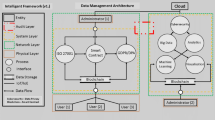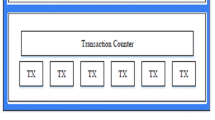Abstract
Recently, voting in elections has become a major topic of debate. The legitimacy of election results is being questioned, whether it be elections on the government, municipality, university, or even department level. This led to a general distrust between the voting populations of developing countries and developed nations and electoral committees. Looking at election turnout rates, it becomes clear that an ever-widening rift between voters and trust in traditionally held elections has caused prominent voter apathy. The general population sees policymakers as not having taken serious strides in solving these problems. Electronic voting was seemingly introduced to alleviate some problems. Yet, the public has expressed concerns about election manipulation through hacking since electronic systems are notoriously vulnerable to those kinds of attacks and are hard to shield from. Introducing blockchain technology to this field is a logical step to evolving traditional e-voting systems. Traditional voting and, by extension, e-voting suffer from centralization, where a single entity oversees the election process. This creates a single point of failure. Thus, it becomes easy to tamper with voter data and election results. Blockchain technology offers a solution to decentralize and restore trust in the process; it embraces decentralization, the entire process becomes open to the public, and the need for a centralized managerial entity is reduced. In this paper, we introduce and implement a blockchain-based voting system that addresses the issues mentioned earlier in centralized voting. Moreover, our system proposes solutions to some of the problems and side-effects that are likely to happen when adopting blockchain-based voting systems, especially the anonymity of the voters and the confidentiality of the results until the time of the official announcement. We show that it is possible to have a voting system that accomplishes decentralization and trustworthiness for all the parties involved in the voting process.






















Similar content being viewed by others
Data availability
There is no data to be publically available with this article, due to the nature of the conducted research.
References
Grnlund, K., Setl, M.: Political trust, satisfaction and voter turnout. Compar. Eur. Polit. (2007). https://doi.org/10.1057/palgrave.cep.6110113
Ta, R., Tanrver.: A systematic review of challenges and opportunities of blockchain for e-voting. Symmetry (2020). https://doi.org/10.3390/sym12081328
Jaoude, J., Saade, R.: Blockchain applications usage in different domains. IEEE Access (2019). https://doi.org/10.1109/ACCESS.2019.2902501
Xia, R.L., Muppala, J.K.: A survey of bittorrent performance. IEEE Commun. Surv. Tutor. 12(2), 140–158 (2010). https://doi.org/10.1109/SURV.2010.021110.00036
Nakamoto, S.: Bitcoin: A peer-to-peer electronic cash system. Cryptography Mailing list at https://metzdowd.com (2009)
Ta, R., Tanrver, O.O.: A systematic review of challenges and opportunities of blockchain for e-voting. Symmetry (2020). https://doi.org/10.3390/sym12081328
Hjlmarsson, F., Hreiarsson, G.K., Hamdaqa, M., Hjlmtsson, G.: Blockchain-based e-voting system. In: 2018 IEEE 11th International Conference on Cloud Computing (CLOUD), pp. 983–986 (2018). https://doi.org/10.1109/CLOUD.2018.00151
Jafar, U., Aziz, M.J.A., Shukur, Z.: Blockchain for electronic voting system review and open research challenges. Sensors (2021). https://doi.org/10.3390/s21175874
Zheng, Z., Xie, S., Dai, H., Chen, X., Wang, H.: An overview of blockchain technology: architecture, consensus, and future trends. In: 2017 IEEE International Congress on Big Data (BigData Congress), pp. 557–564 (2017). https://doi.org/10.1109/BigDataCongress.2017.85
Vujii, D., Jagodi, D., Rani, S.: Blockchain technology, bitcoin, and ethereum: a brief overview. In: 2018 17th International Symposium INFOTEH-JAHORINA (INFOTEH), pp. 1–6 (2018). https://doi.org/10.1109/INFOTEH.2018.8345547
Leonardo, R., Giungato, P., Tarabella, A., Tricase, C.: Blockchain applications and sustainability issues. www.amfiteatrueconomic.ro 21, 861 (2019). https://doi.org/10.24818/EA/2019/S13/861
Ahmad, R.W., Salah, K., Jayaraman, R., Yaqoob, I., Ellahham, S., Omar, M.: Blockchain and covid-19 pandemic: applications and challenges. Clust. Comput. 26(4), 2383–2408 (2023). https://doi.org/10.1007/s10586-023-04009-7
Sober, M., Sigwart, M., Frauenthaler, P., Spanring, C., Kobelt, M., Schulte, S.: Decentralized cross-blockchain asset transfers with transfer confirmation. Clust. Comput. 26(4), 2129–2146 (2023). https://doi.org/10.1007/s10586-022-03737-6
Rajendra, Y., Sahu, S., Subramanian, V., Shukla, S.K.: Storage efficient blockchain models for constrained applications. Clust. Comput. 26(4), 2163–2181 (2023). https://doi.org/10.1007/s10586-022-03804-y
Al-Maaitah, S., Quzmar, A., Qatawneh, M.: Blockchain-based e-voting system for elections in Jordan. J. Theor. Appl. Inf. Technol. 100(5), 1584–1593 (2022)
Malkawi, M., Yaseen, M.B., Habeebalah, D.: Ethereum blockchain based e-voting system for jordan parliament elections. Appl. Math. Inf. Sci. 17(2), 233–241 (2023). https://doi.org/10.18576/amis/170206
Doubleoctopus: Cryptographic Hash Functions. https://doubleoctopus.com/security-wiki/authentication/otp-totp-hotp/
Zhao, Z., Chan, T.-H.H.: How to vote privately using bitcoin. In: Information and Communications Security, pp. 82–96. Springer, Cham (2016)
Haines, T., Gritti, C.: Improvements in everlasting privacy: efficient and secure zero knowledge proofs. In: Electronic Voting: 4th International Joint Conference, E-Vote-ID 2019, Bregenz, Austria, October 1-4, 2019, Proceedings, pp. 116–133. Springer (2019). https://doi.org/10.1007/978-3-030-30625-0_8
Kiayias, A., Zacharias, T., Zhang, B.: On the necessity of auditing for election privacy in e-voting systems. In: E-Democracy—Citizen Rights in the World of the New Computing Paradigms, pp. 3–17. Springer, Cham (2015)
Desmedt, Y., Chaidos, P.: Applying divertibility to blind ballot copying in the helios internet voting system. In: Computer Security—ESORICS 2012, pp. 433–450. Springer, Berlin, Heidelberg (2012)
Ben Hamida, E., Brousmiche, K.L., Levard, H., Thea, E.: Blockchain for Enterprise: Overview, Opportunities and Challenges. In: The Thirteenth International Conference on Wireless and Mobile Communications (ICWMC 2017) (2017)
Castro, M., Liskov, B.: Practical byzantine fault tolerance. In: Proceedings of the Third Symposium on Operating Systems Design and Implementation. OSDI ’99, pp. 173–186. USENIX Association, USA (1999)
Islam, M.M., Merlec, M.M., In, H.P.: A comparative analysis of proof-of-authority consensus algorithms: Aura vs clique. In: 2022 IEEE International Conference on Services Computing (SCC), pp. 327–332 (2022). https://doi.org/10.1109/SCC55611.2022.00054
Nguyen, C.T., Hoang, D.T., Nguyen, D.N., Niyato, D., Nguyen, H.T., Dutkiewicz, E.: Proof-of-stake consensus mechanisms for future blockchain networks: fundamentals, applications and opportunities. IEEE Access 7, 85727–85745 (2019). https://doi.org/10.1109/ACCESS.2019.2925010
Tan, C., Xiong, L.: Dposb: Delegated proof of stake with node’s behavior and borda count. In: 2020 IEEE 5th Information Technology and Mechatronics Engineering Conference (ITOEC), pp. 1429–1434 (2020). https://doi.org/10.1109/ITOEC49072.2020.9141744
Azbeg, K., Ouchetto, O., Jai Andaloussi, S., Fetjah, L.: An overview of blockchain consensus algorithms: comparison, challenges and future directions. In: Saeed, F., Al-Hadhrami, T., Mohammed, F., Mohammed, E. (eds.) Adv. Smart Soft Comput., pp. 357–369. Springer, Singapore (2021)
I/O, G.: Flutter. https://flutter.dev/
Mazières, D.: Co-Routines. https://en.cppreference.com/w/cpp/language/coroutines
Google, E.: WebRTC. https://webrtc.org/
Guidi, B., Michienzi, A.: The decentralization of social media through the blockchain technology. In: Companion Publication of the 13th ACM Web Science Conference 2021. WebSci ’21 Companion, pp. 138–139. Association for Computing Machinery, New York, NY, USA (2021). https://doi.org/10.1145/3462741.3466680
Dhall, S., Dwivedi, A.D., Pal, S.K., Srivastava, G.: Blockchain-based framework for reducing fake or vicious news spread on social media/messaging platforms. ACM Trans. Asian Low Resour. Lang. Inf. Process. (2021). https://doi.org/10.1145/3467019
Song, G., Kim, S., Hwang, H., Lee, K.: Blockchain-based notarization for social media. In: 2019 IEEE International Conference on Consumer Electronics (ICCE), pp. 1–2 (2019). https://doi.org/10.1109/ICCE.2019.8661978
Ochoa, I.S., de Mello, G., Silva, L.A., Gomes, A.J.P., Fernandes, A.M.R., Leithardt, V.R.Q.: Fakechain: A blockchain architecture to ensure trust in social media networks. In: Piattini, M., Rupino da Cunha, P., García Rodríguez de Guzmán, I., Pérez-Castillo, R. (eds.) Quality of Information and Communications Technology, pp. 105–118. Springer, New York (2019)
Zingher, J.P., Zingher, A.R.: Computerized system for discreet identification of duress transaction and/or duress access. Google Patents. US Patent 5,731,575 (1998)
Querejeta-Azurmendi, I., Arroyo Guardeo, D., Hernndez-Ardieta, J.L., Hernndez Encinas, L.: Netvote: a strict-coercion resistance re-voting based internet voting scheme with linear filtering. Mathematics (2020). https://doi.org/10.3390/math8091618
Funding
The authors have not disclosed any funding.
Author information
Authors and Affiliations
Contributions
HA and OA helped with the mobile part implementation in addition to some helping with the writing and literature review. Both have contributed equally to the work. HA helped with the implementation in the server side and some of the evaluation. MA is the supervisor of the project, overseeing the entire project processes, and driving the research aspect of the work. Moreover, he was the main responsible for writing the manuscript.
Corresponding author
Ethics declarations
Conflict of interest
The authors declare no competing interests.
Additional information
Publisher's Note
Springer Nature remains neutral with regard to jurisdictional claims in published maps and institutional affiliations.
Rights and permissions
Springer Nature or its licensor (e.g. a society or other partner) holds exclusive rights to this article under a publishing agreement with the author(s) or other rightsholder(s); author self-archiving of the accepted manuscript version of this article is solely governed by the terms of such publishing agreement and applicable law.
About this article
Cite this article
Abed, H., Al-Zoubi, O., Alayan, H. et al. Towards maintaining confidentiality and anonymity in secure blockchain-based e-voting. Cluster Comput (2023). https://doi.org/10.1007/s10586-023-04194-5
Received:
Revised:
Accepted:
Published:
DOI: https://doi.org/10.1007/s10586-023-04194-5




